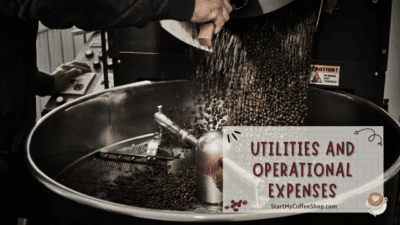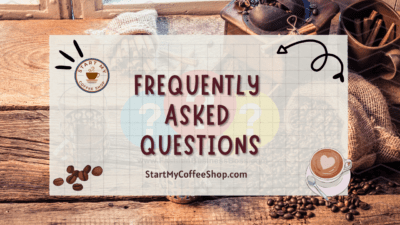Opening a drive-thru coffee shop can be an exciting entrepreneurial venture, but it’s crucial to have a solid understanding of the startup costs involved.
The average startup cost for a drive-thru coffee shop can vary depending on factors such as location, size, equipment quality, and local regulations. However, a rough estimate would range between $200,000 to $500,000 or more.
And in this article, I will delve into the typical startup costs associated with opening a drive-thru coffee shop, exploring the factors that should be considered when estimating these expenses.
Land Acquisition and Building Construction
When embarking on the journey of opening a drive-thru coffee shop, one of the key costs to factor in is the acquisition of land or lease. The location of your coffee shop holds immense importance in determining its improvement.
A suitable spot that offers high visibility, easy accessibility, and convenience for customers is essential for attracting a steady flow of patrons. However, securing such a location often comes with a price tag that can vary depending on factors such as the desirability of the area and the demand for commercial spaces.
In addition to the cost of land or lease, you must also consider the expenses associated with building construction or renovation. This encompasses architectural design, obtaining permits from local authorities, procuring construction materials, and hiring labor for the physical realization of your coffee shop.
The extent of these expenses depends on the size and complexity of the project. A larger and more intricate coffee shop may require a more substantial investment in construction, while a smaller-scale establishment might incur comparatively lower costs.
It’s essential to approach these expenses with careful planning and a comprehensive understanding of your budget. Consulting professionals such as architects, contractors, and real estate agents can provide valuable insights and help estimate the associated costs more accurately. By factoring in the acquisition of land or lease and the expenses related to building construction or renovation, you can establish a solid foundation for your drive-thru coffee shop’s progress.
Equipment and Furnishings
When it comes to opening a drive-thru coffee shop, a considerable expense to account for is the purchase of equipment and furnishings. This category encompasses a wide range of essential items that are crucial for the smooth operation of your business.
Key equipment includes commercial-grade espresso machines, coffee grinders, blenders, refrigeration units, and point-of-sale systems. These tools are the backbone of your coffee-making process and play a vital role in delivering high-quality beverages consistently.
Investing in quality equipment is paramount. High-volume drive-thru coffee shops require durable, efficient, and reliable machinery that can withstand the demands of a bustling operation. While the upfront cost may be significant, choosing reputable brands known for their reliability can save you money in the long run by minimizing maintenance and repair expenses.
The cost of equipment and furnishings can vary based on several factors. Brand reputation, specific features, and the supplier you choose all influence the price. It’s important to conduct thorough research, read customer reviews, and compare prices from different suppliers to ensure you’re getting the best value for your investment. Consider seeking recommendations from industry professionals or consulting coffee shop equipment experts who can guide you toward the most suitable options for your needs and budget.
Permits, Licenses, and Legal Fees
Before launching your drive-thru coffee shop, it is imperative to navigate the regulatory landscape by obtaining the required permits and licenses. These essential legalities typically include health permits, business licenses, zoning permits, and signage permits. The costs associated with these permits can vary significantly depending on the location and the specific regulatory requirements of your area.
Health permits are crucial for ensuring that your coffee shop meets sanitation and food safety standards. These permits may involve fees for inspections and renewals to maintain compliance with health regulations. Business licenses grant you the legal authorization to operate your coffee shop and may involve an application fee and annual renewal charges.

Zoning permits are essential for verifying that your coffee shop’s location is in line with the designated zoning regulations. These permits ensure that your business aligns with the intended land-use restrictions and may incur fees depending on the jurisdiction.
In addition to permits, consulting with a lawyer is highly recommended to navigate legal complexities and ensure compliance with all applicable regulations. Legal advice helps safeguard your business, but it may involve additional costs, depending on the attorney’s fee structure.
While permit and licensing costs can vary, it is crucial to budget for these expenses. Research local regulations and engage with relevant authorities to gain a clear understanding of the requirements and associated costs. By obtaining the necessary permits and licenses and seeking legal guidance, you can establish your drive-thru coffee shop on a solid legal foundation, mitigating potential risks and ensuring compliance with all legal obligations.
Read more about Start-up Costs for Sit-Down Coffee Shops: An In-Depth Look at Start-Up Costs
Branding and Marketing
Establishing a strong brand identity and implementing effective marketing strategies are essential components for the achievement of your drive-thru coffee shop. Branding expenses encompass a range of activities aimed at creating a unique and recognizable identity for your business.
This includes designing a captivating logo that represents your brand’s essence and values. Investing in professional graphic design services ensures a visually appealing logo that resonates with your target audience.
Creating a visually appealing store aesthetic is another crucial aspect of branding. This involves interior and exterior design elements that align with your brand’s theme and create a welcoming atmosphere for customers. The costs of branding may also include developing a cohesive brand image through consistent color schemes, typography, and messaging across various marketing channels.
Marketing costs encompass a variety of strategies to promote your drive-thru coffee shop and reach your target customers. This can include website development or optimization to provide an online platform for information, ordering, and customer engagement. Social media management involves maintaining active profiles on platforms such as Instagram, Facebook, and Twitter, engaging with followers, and running targeted advertising campaigns.
Additional marketing expenses may arise from traditional advertising channels like print media, radio, or television, depending on your target market and budget. Promotional materials such as brochures, flyers, and business cards are also important tools for spreading awareness and attracting customers.
The extent and complexity of your branding and marketing strategies will influence the overall costs. It is crucial to set a budget, determine priorities, and explore cost-effective options. Consulting with marketing professionals or agencies can provide valuable insights and help optimize your branding and marketing efforts within your budgetary constraints.
Inventory and Supplies
To serve a diverse range of coffee beverages, pastries, and other products, it is essential to maintain a well-managed inventory of supplies. This inventory encompasses various items, including coffee beans, milk, syrups, sweeteners, disposable cups, lids, stirrers, napkins, and other essential consumables.
The cost of inventory can vary depending on factors such as the size of your menu, projected sales volume, and supplier agreements. Offering a wide selection of coffee beverages and menu items may require a larger inventory investment compared to a more focused menu. It is important to strike a balance between offering variety and managing inventory costs.
Establishing relationships with reliable suppliers is key to ensuring a steady supply of quality ingredients and materials. By partnering with reputable suppliers, you can negotiate favorable pricing and delivery terms, which can contribute to cost savings.
Careful inventory management is crucial to control costs and reduce waste. Monitoring sales trends, tracking inventory turnover, and implementing inventory control systems can help optimize ordering and minimize excess or expired inventory. Regularly reviewing and adjusting inventory levels based on customer demand can help strike a balance between meeting customer expectations and avoiding unnecessary costs.
Staffing and Training
To provide excellent customer service and maintain operational efficiency, a skilled and well-trained staff is essential for your drive-thru coffee shop. The cost of staffing encompasses various roles, such as baristas, supervisors, cashiers, and support personnel.
Determining the optimal number of employees required for your business depends on factors such as your operating hours and anticipated customer flow. Careful consideration should be given to ensure adequate coverage during peak times while avoiding overstaffing during slower periods. Balancing staffing levels helps optimize labor costs and maintain efficient operations.
In addition to hiring, investing in initial and ongoing training for your staff is crucial. Proper training ensures that your employees are equipped with the necessary skills and knowledge to prepare and serve coffee beverages, handle transactions, and provide exceptional customer service. Consistent product quality and customer satisfaction are directly influenced by the expertise and proficiency of your staff.
Staffing costs can also include employee benefits, such as healthcare coverage, vacation time, and retirement plans, depending on your business structure and local labor regulations. These benefits contribute to attracting and retaining top talent in a competitive job market.
Utilities and Operational Expenses

Operating a drive-thru coffee shop involves various ongoing expenses that are essential for smooth day-to-day operations. These expenses include utilities such as electricity, water, and gas. The actual costs of these utilities will depend on factors such as the size of your shop, the equipment you use, and the local utility rates in your area.
In addition to utilities, there are other operational expenses to consider. Waste disposal services are necessary for the proper management of trash and recycling, ensuring cleanliness and adherence to environmental regulations. Cleaning supplies, including detergents, sanitizers, and equipment, are needed to maintain a hygienic and inviting environment for both employees and customers.
Insurance coverage is crucial for protecting your business and assets from unforeseen events, such as property damage, liability claims, or employee injuries. The specific insurance needs may vary, but common policies include general liability insurance, property insurance, and workers’ compensation insurance.
Furthermore, maintenance and repair costs are important to account for as equipment and facilities may require regular servicing or occasional repairs. Proper maintenance helps extend the lifespan of equipment and ensures smooth operations, minimizing downtime and potential disruptions to your business.
Read more about Start-up Cost of a Coffee Shop: Analyzing the Initial Expenses
Estimating Startup Costs
When estimating the startup costs for a drive-thru coffee shop, it’s important to consider various factors:
- Location: The cost of land or lease will vary depending on the area and its demand.
- Size and Design: Larger shops require more space, resulting in higher construction and furnishing costs.
- Equipment Quality: Investing in high-quality, durable equipment may have a higher upfront cost but can save money in the long run.
- Local Regulations: Costs can vary based on permits and licensing requirements specific to your region.
- Market Research: Analyzing the local market and competition helps gauge potential sales volume and adapt pricing strategies.
Summary
Opening a drive-thru coffee shop can be a fulfilling venture, but careful planning and consideration of startup costs are crucial. Understanding the expenses associated with land acquisition, building construction, equipment purchases, permits, branding, marketing, staffing, and operational needs is essential for a great launch.
By conducting thorough research, seeking expert advice, and estimating expenses accurately, you can lay the foundation for a thriving drive-thru coffee shop that attracts loyal customers and generates sustainable revenue.
Frequently Asked Questions

Are there any ongoing expenses after the initial startup cost?
Yes. These can include utilities (electricity, water, gas), inventory replenishment, staffing wages, marketing and advertising, maintenance and repairs, insurance, and other operational costs.
How can I reduce startup costs for a drive-thru coffee shop?
Consider leasing the land or building instead of purchasing it outright. Opt for pre-owned equipment instead of brand new, as long as it is in good working condition. Negotiate with suppliers for favorable pricing and payment terms.
Are there any financing options available for opening a drive-thru coffee shop?
Yes. These can include traditional bank loans, Small Business Administration (SBA) loans, crowdfunding, partnerships, or seeking investors.
To learn more on how to start your own coffee shop checkout my startup documents here
Please note: This blog post is for educational purposes only and does not constitute legal advice. Please consult a legal expert to address your specific needs.

Hi! I’m Shawn Chun
My adventure in coffee began when I first launched my first coffee shop back in the early 2000s. I had to figure out so many things on my own and to make it worse within 2 years of opening two large corporate coffee chains moved in just blocks away from me!
As I saw smaller and even some larger coffee shops in the neighborhood slowly lose customers to these giant coffee chains and slowly close up shop, I knew that I had to start getting creative…or go out of business.
I (like you may be) knew the coffee industry well. I could make the best latte art around and the foam on my caps was the fluffiest you have ever seen. I even had the best state-of-the-art 2 group digital Nuova Simonelli machine money could buy. But I knew that these things alone would not be enough to lure customers away from the name brand established coffee shops.
Eventually, through lots of trial and error as well as perseverance and creativity I did find a way to not only survive but also thrive in the coffee/espresso industry even while those corporate coffee chains stayed put. During those years I learned to adapt and always faced new challenges. It was not always easy, however, in the end, I was the sole survivor independent coffee shop within a 10-mile radius of my location. Just two corporate coffee chains and I were left after that year. All told the corporate coffee chains took down over 15 small independent coffee shops and kiosks and I was the last one standing and thriving.
Along the years I meet others with the same passion for coffee and I quickly learned that it is not only “how good a barista is” that makes a coffee shop successful, but the business side of coffee as well.
Hence why I started this website you are on now. To provide the tools and resources for up and coming coffee shop owners to gain that vital insight and knowledge on how to start a coffee shop successfully.
Stick around, browse through my helpful blog and resources and enjoy your stay! With lots of LATTE LOVE!
Shawn







